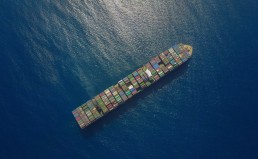SSI is holding a series of seminars and webinars to investigate the sustainability and availability of biofuels for shipping. We recognise that a number of questions surround the current, and potential future, sustainability and availability of biofuels – and we want to build a better understanding of the issues at play before deciding whether and how to proceed.
On 12 August the SSI held a webinar gave us a chance to hear from stakeholders based in the Americas – and to test some of the insights gained from its investigation thus far.

Webinar participants were posed the same questions as those asked at the seminars:
- How supportive are you regarding the use of biofuels in shipping? (5 point scale from “not at all” to “very”)?
- What percentage of energy used in shipping will come from biofuels in 2030?
- What percentage of energy used in shipping will come from biofuels in 2050?
Compared to the stakeholders at the seminars, the webinar audience was more supportive of the use of biofuels in shipping, and more bullish about the percentages that might be used in both 2030 and 2050 – although the majority view was still that biofuels would not become the dominant ‘propulsion technology’ across shipping on either a 2030 or 2050 timeframe.


Key points emerging from the wider webinar discussion were :
- We will need a functioning bioeconomy to wean ourselves – collectively – off fossil fuels, and shipping can play a strong role in the here and now by demonstrating a potential market for sustainable biofuel (even if, over time, it turns to alternative technologies).
- Indirect land-use change (ILUC) appeared again as a key concern – as was the potential for different biofuels to have widely varying carbon profiles.
- A strong desire was voiced for the private sector to speak up for landscape-scape ecological protection – and the need for any biofuel production to support this – in South America
- The idea that aviation and shipping would necessarily be in direct competition was biofuel was challenged – the biofuel production process is, as with the oil refining process, likely to result in a variety of ‘fractions’. Thus, in order to produce the high-quality biofuels that aviation will require, the production process will also create a number of lower-quality fuels that are more suited to shipping.
- Further, the fact that ship engines can handle lower quality fuels than aviation means that the shipping sector arguably has the greater potential to drive demand/provide market confidence in the near term (given the lower performance thresholds that must be met).
NB. Without sustainability criteria in place, there is also, therefore, increased potential for shipping to drive the market in an unsustainable – rather than a sustainable – direction. - It was therefore argued that, rather than being seen as competitors, aviation and shipping could be complementary/supportive partners in ensuring the development of a sustainable bioeconomy.
NB. This idea was both raised – and challenged – in our seminars. It was challenged on the basis that future technology might resolve the need to create differing ‘fractions’ through the refinery process. (eg, advanced Fischer-Tropsch techniques)

Presentations delivered at the seminar
Yuanrong Zhou, International Council for Clean Transportation
Gerard Ostheimer, Managing Director below50/World Business Council for Sustainable Development

